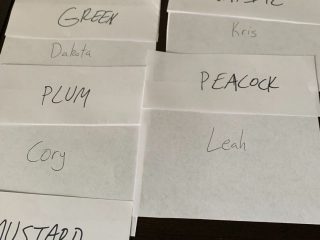I’ve been remote-teaching middle school drama for six weeks now, and I’ve got to say…it’s rough.
For those of you in similar situations, feel free to take a moment to do two things that I do daily:
- Recognize the great fortune that it is to have a job with a paycheck, my health, and the opportunity to connect with my students in some capacity.
- Acknowledge that teaching in this situation is not ideal. It is hard, it is sad, it hurts. It is challenging in ways we haven’t previously been challenged, both as people and as teachers.
But here’s the thing: we can’t teach our own difficulty. We can’t teach our own challenges, our own struggles. We have to give our students something to engage in, provide them with an attempt at structure, and forgive them if/when they fall short of our expectations. In fact, we should probably just go ahead and lower our teaching expectations–not because we are bad teachers who don’t care, but because we cannot presume to know everyone’s home life, mental state, physical health, bandwidth.
All of the following ideas assume that you are able to teach remotely, and your students have access and are able to learn remotely.

SOME PROJECT IDEAS:
Video projects!
I have had students film their monologue performances for submission (check out StageAgent’s selection of monologues for kids and teens), but I’ve also used this as an opportunity to assign full video projects, allowing them to flex their director/filmmaker muscles. If they have movie-making apps available to them, (my students have iMovie,) you can require use of filters, music, sound effects, variety of camera angles, etc.
Makeup Tutorials!
I’ve begun making “Miss Chris’ Mediocre Makeup Tutorials” on YouTube for my students. These are relatively palatable stage makeup tutorials, all under 10 minutes in length. The kids don’t have to show me a finished project, and watching them is totally optional. But if they have supplies at home, it’s a great way for them to interact with you step by step. Here’s one of mine as an example.
StageAgent also have some great ideas for scary makeup, fake facial hair, and special effects.
Playwriting!
I do a lot of playwriting and playmaking in my classes, so my students already understood some basic writing expectations when we began social distancing (like how to write scripted dialogue, or that scenes should have a beginning/middle/end.) A prompt may look like:
- Write a scene with two characters!
- 26 lines long (not including stage directions)
- The scene must take place in one location and time period.
- The first line of the scene is, “I didn’t think I’d ever see you again.”
(Then, as a follow-up assignment, they can film themselves playing one or both of the roles.)
Design!
- Perhaps students take photos of the sky at various times of day, to create a spring natural light portfolio as lighting designer research.
- Study their bedroom as though it were a set, what can we tell about the character who lives here?
- Lego/household object set design.
- Draw or create/photograph costume designs for a particular play/scene.
- Create the sound score for your morning routine.
- Arts and crafts prop creation.
Longer-lasting projects that incorporate several theatrical skills.
A project that I just attempted with some success was a video project, Detective _______ and the Mystery of _______! With this larger scale project, students:
- Pitched a concept for a Detective Movie
- Came up with the plot/script
- Cast the actors (lots of 5-year-old sibling villains)
- Came up with their setting/costumes
- Added sound effects and a score
- Directed and edited a video
I was able to get several classes worth of material from one project, that also allowed them to brainstorm, write, direct, perform, design, film, edit. At the end, many had really awesome stand-out projects.
SOME GENERAL SUGGESTIONS:
Let them see your face.
Some remote teaching scenarios allow teachers to directly interact with students via Zoom or Hangouts or some other platform. Some are asynchronous (mine mostly has been) and have you leave projects for students to complete by a certain due date. If you don’t have the opportunity to directly interact with your students, how often can you submit instructions through video for them to watch? It’s a more personal touch that some will greatly appreciate.
Suggest the (optional) incorporation of other family members/pets.
In my video projects, I’m now seeing a lot of immediate family involvement–and dogs! It’s a nice way to have the work not feel solitary. I don’t require it for many reasons, but putting it out there as an option seems to inspire a lot of students to interact with their family in a new way. (Note: I know some teachers who are experimenting with work between peers. My students have mixed feedback on that. With everyone in varying home and emotional situations, it’s difficult when students aren’t on the same page or don’t have the same access and ability. That being said, I’m sure it depends on your students, your program, your classes.)
Be forgiving.
Remote teaching is a huge amount of work, without the benefit of seeing my students’ faces in real life. It can be frustrating to dedicate so much time and energy and then see so many missing assignments, but it’s important to remember that these are children struggling through something unprecedented and we aren’t there to guide and encourage them in the same capacity we used to be. Accept work late, give partial credit, allow extra credit, drop the lowest grade, something! Something that allows a little more space for them to falter.
Find a way for students to engage in each other’s work.
I like using something like Flipgrid or Google Drive so that students can access one another’s performances. I love for them to get to see what other people created. It helps keep the classroom vibe a little bit.
And that’s about all I’ve got at this point! Though week by week, I keep coming up with new ways to be better and also new ways to mess up.
I am by no means doing this perfectly, and you won’t either. Teaching is always messy and unpredictable, requiring a great deal of patience and flexibility. Those qualities are being put to the test now more than ever. But if anyone is equipped to handle it, it’s us. It’s teachers. Extend your forgiveness to yourself, and allow things to be muddy and weird while you figure out what works best for you and your students.
One thing I feel so acutely: the arts, though battered, remain strong. And we’ll be back stronger than ever.
For further tips, check out our blog post on 31 useful things you can do on StageAgent from home!

















1 comment
Thank you for your great suggestions!